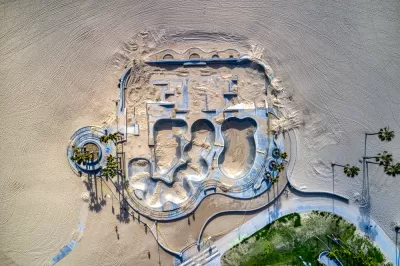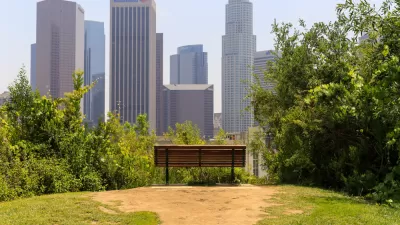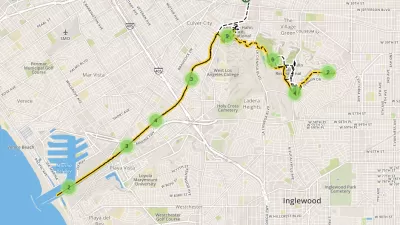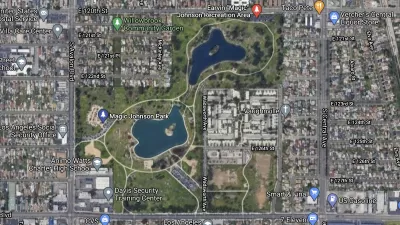With COVID-19, the Los Angeles County Department of Parks and Recreation modified its popular Parks After Dark program so that it could still meet community needs, while complying with public health orders.

Parks After Dark (PAD) is a highly popular, award-winning program offered by the Los Angeles County Department of Parks and Recreation (DPR). PAD started in 2010 at three county parks and expanded to 33 parks in 2019. For an eight-week period each summer, PAD extends hours of park operation from 6:00 to 10:00 pm at participating parks. The program offers family entertainment (like movies, concerts, arts and crafts, and free meals), sports and recreational activities (like swimming and dance), cultural and educational programming (like healthy cooking and financial literacy classes), and employment and volunteer opportunities for youth and adults. PAD parks also host resource fairs through which public agencies and community-based organizations provide health, social, economic, and legal resources to participants.
Unfortunately, due to COVID-19 and associated public health orders, DPR could not offer PAD this summer. However, this did not stop the agency from pivoting and being creative in its efforts to meet community needs for exercise and recreation. DPR quickly developed the PAD in Motion program through which it closes off park-adjacent streets for residents to safely walk and ride. Specifically, this initiative provides community members—especially families with children—opportunities to walk and ride their bikes, scooters and skateboards along a designated route around and within their local park. PAD in Motion is offered at ten parks in various unincorporated communities in Los Angeles County every Thursday evening from 5:00 p.m. to 8:00 p.m. and Saturday mornings from 8:00 a.m. to 11:00 a.m. through early to mid-October (depending on the park location).
As park planner Clement Lau explains in the article, PAD in Motion achieves many of the goals of the original program, such as increasing physical activity, decreasing chronic disease risk, and increasing social cohesion and family bonding. Also, as an open street program, PAD in Motion offers various benefits, including encouraging residents to be physically active by providing additional space for walking and bicycling, and improving actual and perceived public safety by having more eyes on the street and eliminating vehicular traffic while the program is running. The local parks and streets included in PAD in Motion were selected thoughtfully and strategically, prioritizing unincorporated communities with a very high or high level of park need per the 2016 Countywide Parks Needs Assessment, and taking into consideration factors such as roadway classification and location in relation to park entrances and the need for a variety of sites to serve residents across L.A. County.
FULL STORY: Parks After Dark in Motion: Meeting Community Needs in the Midst of a Pandemic

Planetizen Federal Action Tracker
A weekly monitor of how Trump’s orders and actions are impacting planners and planning in America.

Restaurant Patios Were a Pandemic Win — Why Were They so Hard to Keep?
Social distancing requirements and changes in travel patterns prompted cities to pilot new uses for street and sidewalk space. Then it got complicated.

Map: Where Senate Republicans Want to Sell Your Public Lands
For public land advocates, the Senate Republicans’ proposal to sell millions of acres of public land in the West is “the biggest fight of their careers.”

Maui's Vacation Rental Debate Turns Ugly
Verbal attacks, misinformation campaigns and fistfights plague a high-stakes debate to convert thousands of vacation rentals into long-term housing.

San Francisco Suspends Traffic Calming Amidst Record Deaths
Citing “a challenging fiscal landscape,” the city will cease the program on the heels of 42 traffic deaths, including 24 pedestrians.

California Homeless Arrests, Citations Spike After Ruling
An investigation reveals that anti-homeless actions increased up to 500% after Grants Pass v. Johnson — even in cities claiming no policy change.
Urban Design for Planners 1: Software Tools
This six-course series explores essential urban design concepts using open source software and equips planners with the tools they need to participate fully in the urban design process.
Planning for Universal Design
Learn the tools for implementing Universal Design in planning regulations.
Heyer Gruel & Associates PA
JM Goldson LLC
Custer County Colorado
City of Camden Redevelopment Agency
City of Astoria
Transportation Research & Education Center (TREC) at Portland State University
Camden Redevelopment Agency
City of Claremont
Municipality of Princeton (NJ)





























